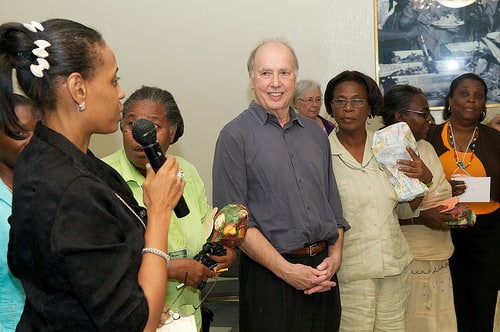Two months after gunfire and bonfires in the streets interrupted our first Haiti Professional Training Program our participants are back – with stories of how they have used what they learned from us and what they have taught to others.
Their faces are eloquent with change as we sit together in the circle of our small group. Marilyn the pediatrician, looking almost as young as her twenty something daughter, is laughing as she greets us. James, the head of psychology for the National Police, has put on ten much needed pounds. And Ty Rose the anesthesiologist looks as content as she says she is.
“I am teaching the nurses to give anesthesia.” Ti Rose begins, after we have done our opening “soft belly” meditation. “And of course there is never enough equipment and much that we have doesn’t work. But I am somehow easier in my mind. I breathe deeply and do my best and teach my students to do the same, and it is going very well indeed.”
“Police work,” James says, “is an at risk job.We lost many colleagues in the earthquake and many more of us are still living in the streets. There is great stress. But I am doing the CMBM techniques and teaching them. And I am these last two months usually calm – and even calmer now after breathing together.”
The next morning the riskiness of his profession will be brought home once again. “I woke to learn that two of my colleagues were killed, but the soft belly I did at home and here, and this morning’s yoga helped so much. You know how here in Haiti we put coffee in a sock and drip the water through and afterwards the coffee is just lying there – very even, but also full of energy. That I believe is how I am.”
Marilyn has begun to move through the melancholia that engulfed her in the year after the earthquake, beyond the deaths of her brother in the quake and her husband in the political violence that has followed it. “I remember my loss and I cry, but then I use the guided imagery and the deep breathing and dance like I did when I was a teenager and I watch my mood change, and the insomnia has gone. And I am sharing what I am learning with my patients and in my church.”

The next day she will discover in her genogram – her family tree – another source of strength: “My father’s brother disappeared in the Duvalier regime and my auntie raised six children on her own. Many in my family have faced difficult situations” – she laughs now – “and I am finding strength from them as I look at this genogram, and from God too – I think he is all over this genogram – and the love he still has for me.”
And Mercedes, who has metamorphosed from impassive to expressive, cannot wait to “partager,” to share what has happened to her.
Continued–to read about Mercedes’ transformation, click here


